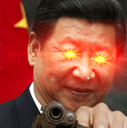
CPI has 650k members, CPI(M) has 100k members.
CPC is the largest Communist Party in the world.

CPI has 650k members, CPI(M) has 100k members.
CPC is the largest Communist Party in the world.

CPC has almost 100 million members. Are they China campists, Marxist-Leninists, or both?
I’d argue that of the international Communist movement, the majority of party members are Chinese.

That was literally made and supported by Moffin’, who was, if you trust Zeke Roa (an admin on Getchan) a board developer on Leftypol.
The serious issue I see right now is more a push by “parts of the left” to cancel China using the “anti-campist” line.

Campist is a difficult word, given its association with board collapse on Leftypol.
Moreover, you make it difficult for me to try to argue for a more balanced and critical take on China (i.e, avoiding over-idealization that will lead to disapointment on encountering realities), because this aligns with the general Western anti-China take too much.

I support a common-sense level of paranoia. As long as you don’t do something illegal or too threatening, you’re fine.
I don’t think people here are on the verge of crossing the line, whereas on Leftypol you had former posts discussing guns, as well as NAFO glowtrap posts discussing drone terrorism.

TBH, I just think it’s best to assume everything is a glowop and try to focus on useful praxis and useful theory. Even if things aren’t glowops now, if you get enough visibility, security agencies will come after you.

It’s three fabs. Intel, meanwhile, is falling apart.
The important thing, imo, is that the US doesn’t achieve full chip independence before 2030, which allows a peaceful resolution of the Taiwan issue (i.e, Chinese customs blockade redirecting Taiwanese shipping and passenger traffic to China). I don’t see American reshoring settling the issue early, even though Intel is likely to get automated fabs up by 2028.

I’m probably going to repost a finished version soon, but I’ll leave this comment.
I’m basically trying to import/export socialism with Chinese characteristics to Western contexts.
The only real difference is that we generally do not have control, and are insurgents until we control enough of the economy. And adventurism around the 33% scale becomes viable: i.e, aggressive means to destabilize competitors, like forced unionization, industrial espionage, and financial warfare (hope you liked your CDS in 2008!)

I’ve never said anything about having the right people in charge; this post is about a change in strategy and methods.
I also don’t think I’ve jettisoned the idea of class struggle because the idea of using industrial cooperatives that are also party-owned means that such enterprises are essentially proletarian and proletarian controlled in character, but it moves class struggle from the social and political environment to the economic marketplace.
Destroy Porky’s market share. Kill bourgeois profits. Different mindset, different mechanisms.

I’d like to put out a fuller response, but I’d rather have fully posted the OP.
I think Hazan put out a similar idea for how he’d want to build the ACP, but I think he’s oversimplified things and hasn’t identified the flaws, even at a minimum stage. I think the ACP, in general, is not qualified for his business plan of having party cells operate as enterprises, and it’ll rapidly go down the sink for that reason.
As for your criticism concerning capitalist opposition, the simple way to do it is simply to publicly list the POE / industrial cooperatives (but not the party itself) once the business is viable, taking care to maintain worker / party control, but allow the bourgeoisie to buy stakes.
It’s Dengist insofar as that’s how Deng and China succeeded; capitalists will sell you the rope that will hang them, if they think it’ll make them a quick buck. If, say, Blackrock and/or Goldman own a 30% stake, you essentially have cover from elements of the capitalist system, because they want to protect their investment.
As an addendum, part of the idea is simply to have a lopsided incentives structure (in at least some of the firms within Red Zaibatsu) such that the business HAS to be Marxist in order to function. To cut to the chase, the level of labor discipline and pay is such that you won’t work at a Red Zaibatsu-held firm unless you were ideologically committed, and if these firms somehow lose their Marxist character, it simply no longer makes sense to work at such a company.
It’s what I’d bring up as to how Huawei works (Huawei is abusive insofar as its prospective long-term employees are expected to sign a strivers’ contract pledging dedication to the firm, which includes being assignable across the planet as the company sees fit, and working extremely long hours. Note that Huawei is still a worker’s cooperative with profit sharing).
The ideological commitment to socialism, in my view, is the competitive advantage that allows “vanguard-type” (not all Party-held firms are vanguard-type) firms to defeat their capitalist competitors, and if you destroy the system of worker and party ownership while capitalists are invested, well, you just forced Goldman / Blackrock to take a huge haircut on their investment, because the company is no longer competitive. That protects the Party-owned economy from the wider capitalist system.

Less outrage, more shades of Diem: https://en.wikipedia.org/wiki/Ngo_Dinh_Diem , who persecuted Buddhists.
Zelenskyy’s approval rating, likewise, is starting to go down the tubes.

Sounds like they got kicked out and decided to write a kvetch column. Beijing seems more interested in using social media to present a view to the world, instead of a hostile Western press.

Screenshot it if you can find results on Baidu. I see some ancillary results discussing how production etc was disrupted by 6-4, but nothing discussing the incident itself, although I still need to go through the State Council logs.
Basically, in parts of the left-wing community, there’s a tendency to overidolize China, when China itself admits that Mao was 30% wrong, and considers itself a developing country that is still searching for solutions.
The problem is, if you become completely divorced from reality, you impede your capability for praxis, and set yourself up for disappointment and alienation from the movement (“they lied to me!”) if you step foot here and stay for extended periods of time.
I’d consider unsustainable “ultra” beliefs wrecker behavior by hostile forces, when there is already a lot to admire in China, just as there are things to reasonably gripe about.

https://en.wikipedia.org/wiki/Whole-process_people's_democracy
Wikipedia can’t be cited, but you can always steal its sources.
Whole process people’s democracy
https://english.www.gov.cn/news/202403/03/content_WS65e47e91c6d0868f4e8e494c.html https://archive.is/FNP6x#selection-423.0-426.0
IIRC, the Chinese were exploring similar processes to the Singaporeans, who also have a one-party state (except theirs is a cross between social democracy and fascism, as opposed to a cross between classic AES and social democracy). This employs the use of polling, surveys, and focus groups to constantly investigate what the people want, and put it into consideration for policy decisions.
Another buzz word in China is the mass line, so if you don’t have time or can’t extend the scope to compare and contrast different countries’ definitions of democracy, you can simply explore how the notion of democracy has evolved in China from Sun Yatsen (Sun Yixian) to Xi Jinping, and how China, mostly, lives up to its own definition of democracy.

https://www.marxists.org/reference/archive/mao/selected-works/volume-4/mswv4_65.htm
As the other poster says, define democracy.
Exploring Communist, read: statist, notions of what democracy is as well as what Western notions of democracy is, especially in the context of multiculturalism is at least an interesting angle.
The United States is democratic by its own definition, and China isn’t democratic by American definitions. China is democratic by its own definition, and the United States isn’t democratic by Chinese definitions (look up bourgeois democracy).
This is a more interesting angle than simply arguing that China is a democracy by Western definitions, and if you have time, you can also consider Iran.

Yeah, looks like a bunch of State Council publications dating to 1989 around the time of the incident.
实事求是?
If you had guidance from the Foreign Ministry on the topic, it’d be better. I’ll go over it tomorrow, it’s late.
Thanks for the link!

In my personal dealings with Chinese authorities, they’ve been very kind and unwilling to use excessive force.
What I’ve been told by acquaintances is that the BLM dream has actually been achieved in China: run-of-the-mill cops are terrified of getting put under investigation and thus be by-the-book. Just do try to avoid giving them excuses to be passive aggressive, however, which is how you should deal with (reasonable) authority in general.

I’m in China, and please enter the search query that produces results on the Tiananmen Incident of 1989.
天安门事件 links me to the peaceful protests of 1976. I guess I can search Baike, but this is not a subject for common discussion.
wapbaike.baidu.com/search/none?word=六四&pn=0&rn=10
I do admire your enthusiasm for protecting China against defamation, but there is a difference between useful support and going too far.
I am willing to admit that I am wrong, however. There are mentions of a 64 Tiananmen incident on Baidu, but nothing that specifically focuses on the event. I would like you to point me to search strings on Baidu that clearly focuses on and presents an official line on the Tiananmen demonstrations that ended on June 4th, 1989.

deleted by creator
Removed by mod